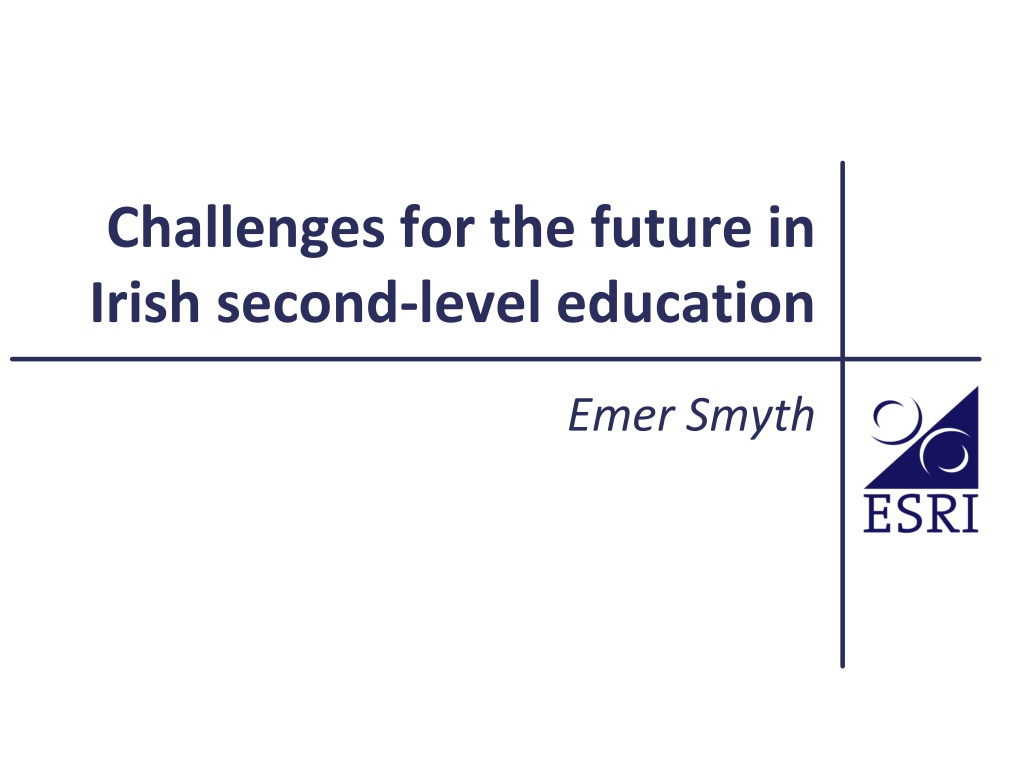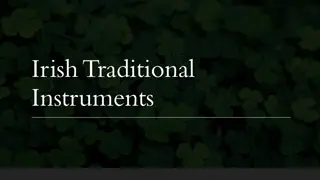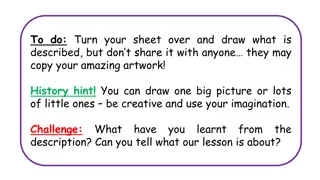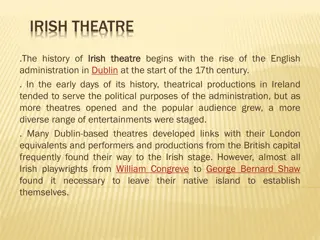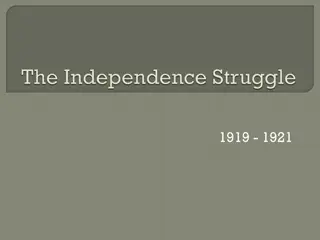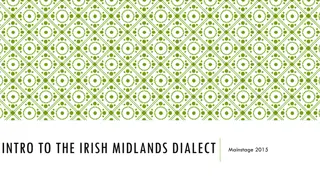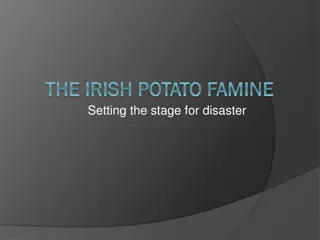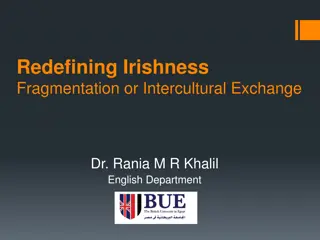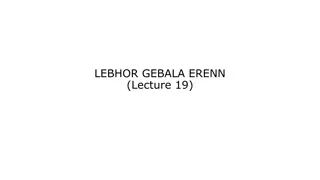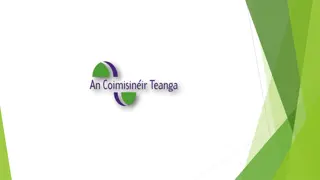Challenges in Irish Second-Level Education: A Study by Emer Smyth
Exploring challenges and opportunities in Irish second-level education, Emer Smyth discusses the importance of listening to student voices, assessing the educational system, and the impact of teaching methods and school climate on student experiences.
Download Presentation

Please find below an Image/Link to download the presentation.
The content on the website is provided AS IS for your information and personal use only. It may not be sold, licensed, or shared on other websites without obtaining consent from the author. Download presentation by click this link. If you encounter any issues during the download, it is possible that the publisher has removed the file from their server.
E N D
Presentation Transcript
Challenges for the future in Irish second-level education Emer Smyth
Introduction Various ways of reflecting on an educational system and its challenges: Assessing it in terms of external benchmarks (e.g. PISA) Using internal benchmarks (e.g. changes in retention) Listening to stakeholders and practitioners Listening to students themselves
Student voice Increasing focus internationally on the value of taking account of the perspective of children and young people in research/evaluation, service design and delivery, and policy development Value of listening to students: Its capacity to strengthen pupils commitment to learning and to contribute in realistic and exciting ways to school improvement. (Rudduck and McIntyre, 2007) Focus on challenges raised by student perspectives on their education (drawing on the Post-Primary Longitudinal Study)
Background to the study The first longitudinal study exploring students experiences in Ireland Cohort of 900 students in 12 case-study schools Surveyed from 1st year to 6th year plus group interviews with students Follow-up of individual early school leavers Survey of, and interviews with, parents Followed up 3-4 years after leaving school (Leaving School in Ireland study) Unique insights - capture the student voice but multiple perspectives (principal, key personnel, parents)
Three aspects of student experience What is good teaching? What helps students learn? School climate: the nature of teacher-student relations Schooling as preparation for the future
1. What is good teaching? Teaching methods Clear explanation If they explain things well enough for the student to understand. If they have a second way of explaining it maybe; if you didn t get it the first way, they can tell you the second way. (Hay Street, coeducational school, working-class, LC) Preference for active learning, fun I remember the [teacher] came in and she had like, not games but I think that stuck in my head more. Like cards, like a picture and the French underneath. It's more like fun to remember, when you do it in a fun way. (Harris Street, girls school, middle-class, JC) Being allowed to express opinions; interactive
What is good teaching? Teacher qualities Enthusiasm for the subject Respect A caring environment An orderly environment [A good teacher is] One that actually cares about the students, whether or not they do well in their exams as opposed to just going in for the forty minutes, teaching and then leaving. Yeah, they have to have patience as well. (Fig Lane, coeducational school, middle-class, LC)
What is bad teaching? Didactic methods; reading from a book Lack of respect for students I don't know, she [the teacher] doesn't explain things, she just kind of puts it there and do it, do it and that's it, she doesn't explain it, it s like do it and you re just sitting there looking at it and then she gives out to you. (Dixon Street, coeducational school, working-class, JC) Because when they give out to you, you can't concentrate, well I can't. Because when a teacher gives out to you you're in a fuss then with them and then you can't just sit there and concentrate then after that You just won't work for them because they're roaring at you. (Barrack Street, girls school, working-class, JC)
Pace of instruction (junior cycle) 50 40 30 Too slow Right Too quick % 20 10 0 Mixed ability Higher stream Middle stream Lower stream
Teaching in the exam years Junior Cert students contrast good teaching (clear explanation, making learning fun and more student involvement) with the exam focus in 3rd year You used to do fun things in class, they'd come in and say let's play games. If you say it this year you get like stared at, what do you think you are? It relates to everything, the exams, you're doing your Junior Cert you shouldn't be talking, you'll miss out on stuff. (Harris Street, girls school, middle-class, JC)
Teaching methods in sixth year (% every/most classes for LCE/LCVP)
Views of learning: LC By 6thyear, many view teaching to the test as a signal of a good lesson For many Leaving Cert students, good teaching is preparation for the exam This is more evident for middle-class students with high aspirations Like some teachers kind of go off the point sometimes and just waffle on about pointless things that isn t on the course and stuff. (Fig Lane, middle-class coeducational school, LC) Like my Home Ec teacher, she comes in and she knows how to cook, she tells us all about how to make mayonnaise today. That s not on our course, we don t care. (Harris Street, middle-class girls school, LC)
Grinds and exam preparation Over of 6thyears were taking grinds ; varied by gender and social background Like in Maths, they go straight to the thing that you have to do for the Leaving Cert, rather than going through all the stuff that you don t have to do, that you don t really need to know. (Park Street, mixed intake boys school) They re so exam based and you just know that you re learning the right stuff, so I find them real helpful. (Fig Lane, middle-class coeducational school)
2. School climate Changes in student-teacher relations 3 2.5 2 1.5 1 0.5 0 1st year (September) 1st year (May) 2nd year JC year 5th year LC year Positive Negative
Liking school and teachers 3.5 3 2.5 2 1.5 1st year (Sept) 1st year (May) 2nd year JC year 5th year LC year Liking school Liking teachers
Student disaffection Emerging dynamic of giving out and acting up Negative interaction increases more in working- class schools and in lower streamed classes School drives you mad, it actually would, the teachers, if you'd better teachers there would be no one getting in trouble. When you come back at the start of the year you re alright for a while. You calm down but then it starts building up through the year because you re so bored of school and you want to get out of it. (Lang Street, working-class boys school, middle stream class)
Impact of school climate School completion: negative relations with teachers a dominant theme in early leaver accounts I hit third year and I just started not getting on with the teachers and all. I kept getting thrown out of classes and suspended all and I just hated it and I hate that school. (Elaine, Dixon Street, Senior Cycle Leaver) The teachers say stuff to you like, you know kind of put you down so then you feel like oh I haven t got the teacher on my side, they don t want to teach me so like, is there any point being here at all. (Eric, Argyle Street, Senior Cycle Leaver) Educational achievement: negative interaction and underperformance Personal and social development: stress levels; self-image, including capacity to cope with schoolwork
3. Student views of the benefits of second- level education (% a lot ) Make new friends Communicate well Reading/writing skills Know how to acquire skill Find things out Increasing self-confidence Well-balanced person Think for yourself Decide to do after school Prepare for adult life Involved in sports Computer skills Prepare for work Reading for pleasure Appreciate art/music 0 10 20 30 40 50 60
Benefits: friendship Your friends and that would be the only thing you'd take out of it. (Belmore Street, mixed girls school) At least you have something to look back on, at least you had a bit of a laugh with your friends. (Park Street, mixed boys school) You accept people, you re really together in your class and there s so many different types of people in our class. It s good to be able to get on with them. (Harris Street, middle-class girls school)
Benefits: education Just learning about the subjects we did. A broader knowledge. Like general knowledge. (Dawson Street, mixed coeducational school) I think I ve been lucky with teachers that and subjects I did, I ve had quite a good education here. Even though there s one real bad teacher I ve had fairly good education. (Wattle Street, mixed boys school) That s about it, the Leaving Cert. (Park Street, mixed boys school)
Benefits: work/life skills You re around people and it s kind of like being in a work place, you re around talking to people and learning things. I suppose you just learn to obey rules, like not coming in late and get yourself prepared for a job. (Park Street, mixed boys school) Value of work experience; but access depends on the programme taken
Student views on the gaps in second-level education: preparation for college/work Job things, work experience should have been part of 6th year maybe at the start of 6th year to see what jobs, even in 5th year, to see what jobs you might like to do. (Fig Lane, middle-class coeducational school) Just to tell us a bit about what What college is like and all that. Yeah, what college we can go to, what we can do after college. (Dawson Street, mixed coeducational school)
Gaps: preparation for adult life [School ] prepares you for college and that s where you learn for your adult life. You're only prepared for the education side of college. (Harris Street, middle-class girls school) Some teachers will prepare you about like what life is going to be like on your own and all that but most of them are just going on about the basic subjects they are not preparing us for going out and just working and living on your own and coping with things. (Barrack Street, working-class girls school)
Transition to further/higher education 100 90 80 70 60 50 % HE PLC 40 30 20 10 0 Teaching & learning very different My schoolwork prepared me Course involves lot of project work Course involves lot of tests/exams
Main challenges in first year of ET Fees/costs Knowing what standard expected Course difficulty Juggling work and study Time for other interests Timely completion of coursework Balancing personal relationships 0 10 20 30 40 50 % Major problem Moderate problem
Shift to self-directed learning Challenges of knowing what standard to expect and course difficulty; dealing with deadlines In school you re learning for an exam, in college you re learning to think for yourself, it s just completely different. I don t think school really prepares you for it. (Sandra, Belmore Street, higher education) There s a lot of self-directed work compared to being in secondary school where you ve got someone always behind you and saying, pushing you like you know you have to do this, you re in sixth year, your Leaving Cert is coming up . (Fiona, Barrack Street, higher education)
Conclusions Listening to student perspectives can contribute to policy development (national/school levels) Challenges: Respond to students views on good teaching Foster positive school climate Help prepare students for the future (in a broad sense)
Teaching and learning Student views on good teaching are not always reflected in reality, especially in exam years Current mode of assessment is impacting on young people s view of learning Potential of junior cycle reform to provide space to use more diverse methods; implications for senior cycle Challenge supporting change in teaching and learning to promote student engagement; role of teacher development and peer support
School climate Positive social climate: initial and continuing teacher education; school development planning Positive behaviour policy; student involvement in school life
Preparation for the future Broad perspective: preparation for lifelong learning, work and adult life; but also continued engagement with valuable forms of knowledge Work experience: Access depends on senior cycle programmes taken Career sampling v. job Role of project work at junior and senior cycle Whole-school and specialist guidance throughout second-level education; especially important for disadvantaged students and schools
